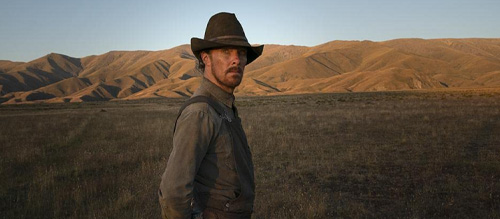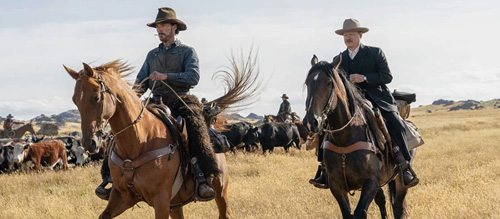The Power of the Dog (2021)
Director: Jane Campion
Screenwriter: Jane Campion
Starring: Benedict Cumberbatch, Jesse Plemons, Kirsten Dunst, Kodi Smit-McPhee
What hides under the surface of men? Is masculinity, in the simplistic terms we understand it, equal to power? To answer these questions, Jane Campion takes us to a time when men roamed the earth untamed, the American wild-west. The Power of the Dog, based on Thomas Savage’s novel of the same name, takes place in 1925 Montana, where men prevail over the ruthless frontier, their rough hands and weathered boots dominating the barren landscape everywhere the eye can see. Outwardly, life in this place is straightforward: strong men persist while the meek crumble into the dust.
Benedict Cumberbatch and Jesse Plemons are Phil and George Burbank, brothers who co-own a successful cattle ranch in the Montana Hills. Yet, while bonded by blood and the family business, Phil is the antithesis of George. Cumberbatch’s Phil is a brittle and twisted root, with a mean set of standards for masculinity. In contrast, George, round in the middle, warmhearted and kind in nature, wants more from life than the unforgiving and constricting lifestyle of a cowboy. Yet, despite their polar opposite dispositions, the brothers are two parts of a whole, living and working together and even sharing a bed while away from home. They’ve nestled into a way of life alongside one another: George takes Phil’s insults of ‘fasto’ and begrudgingly accepts his refusal to bathe, and Phil takes the grunt work, allowing George to take the head of their business while he wrangles the men.
This delicate balance changes when George meets Rose (Kirsten Dunst), the lovely proprietress of a restaurant come boarding house. While horrified by the barbarous behaviour of his brother, Rose, a widow whose former spouse died by suicide, recognises kindness in George and accepts his hand in marriage. Despite his physical closeness to Phil, with the beginnings of his relationship with Rose, George reveals just how cold and empty his brotherhood is: ‘I can’t tell you how nice it feels not to be alone anymore,’ he confides to Rose as they travel together to his ranch.
Phil dislikes the idea of sharing his space with Rose, and he makes this plain through petulant behaviour and the off-putting twangs of his accomplished banjo playing. However, it’s Rose’s son Peter (Kodi Smit-McPhee), whom Phil finds the most repugnant of his new company. Peter, a mild-mannered slip of a boy who enjoys making delicate paper flowers for decoration in his mother’s dining room, is everything Phil, who prides himself on conquering his true nature, detests the most. Peter is a well-spoken intellectual with dreams of becoming a surgeon; his soft hands and skinny frame have no place among the callousness of ranch life. Phil torments Peter with insults of “sissy” and “Little Lord Fauntleroy”, and pushes Rose to the brink of hysteria with his unrelenting hostility. He is so utterly foul that we can’t help but to wonder where this bitterness comes from. Why does he find Peter so repugnant? What has happened to Phil to make him this way?

What springs forth from Campion’s narrative is a revolving door of power imbalance between Peter and Phil. Campion sets a gentle pace through their story, crafting an intensely lived-in environment that is both familiar and entirely of another world. Campion makes time for us to observe this world in all of its strange eternity; she labours over images of rope construction, bull castration and backyard hula-hooping. So entangled within the subtle complexities of this world and so consumed by the surface level behaviour of each character, it’s easy to overlook the underhanded subtext of the piece. Cumberbatch plays Phil as a tyrannous zealot, but when he speaks of his lost friend Bronco Henry we see pain and vulnerability creeping at the edges of him. On the flip side of the coin, Smit-McPhee plays Peter as a timid mummy’s boy, but when he effortlessly snaps the neck of a rabbit, we see an unfeeling kind of cruelty bubble to the surface. Campion explores the duality of their characters, reversing their roles by playing kindness, humility and fragility against anger, cunning and pain. As the picture unfolds, it becomes clear that Phil and Peter are opposites. However, when they look at the hills, they see the same image staring back.
Cumberbatch keeps Campion’s narrative on its toes, bringing with him an uneasy sense of violence that threatens to explode during any conversation. His characterisation does, however, often feel heavy-handed: his all too noticeable southern drawl and repressed Britishisms making the actor appear a little too big for his cowboy boots. Kristen Dunst brings a female perspective to the male-dominated world and plays a desperate fragility with her usual accomplished finesse; however, she’s given little else to do other than fret and descend into anxiety-driven alcoholism. Eventually, her character starts to feel little more than one note. Plemons, too, is drastically underused: his presence in the film’s first act sets up a story of yin and yang brotherhood, but once Campion begins to flesh out the polarity between Peter and Phil, he slips uselessly into the background.
Campion’s unyielding eye for the natural world matched with her effortless use of symbolism and sensuality make The Power of the Dog an all-encompassing watch. Johnny Greenwood’s score aids the eerie unknowability of the landscape and characters, and Ari Wegner’s detailed cinematography allows us to feel the dirt under our fingernails. As a whole, the film moves to unpack the wreckage men inflict when they find themselves outplayed and overpowered in the world of their own creation.
18/24


